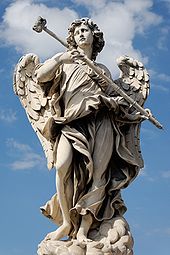

Psalm 69 is the 69th psalm of the Book of Psalms, subtitled in the Authorised Version of the Bible "To the chief musician, upon Shoshannim, a Psalm of David", frequently quoted in the New Testament. In the Greek Septuagint version of the bible, and in its Latin translation in the Vulgate, this psalm is Psalm 68 in a slightly different numbering system.
Uses
Judaism
- Verse 7 is found in the repetition of the Mussaf Amidah on Rosh Hashanah:
- "Because for Your sake I have borne reproach; shame has covered my face".[1]
- Verses 14 and 32 are recited in the blessings before the Shema on the second day of Rosh Hashanah.[2]
New Testament
This psalm is quoted or referred to in several places in the New Testament:
- In John 2:17, when Jesus had expelled the money changers from the Temple, his disciples remembered the words of verse 9: "zeal for Your house has eaten me up".[3]
- In John 15:25, Jesus related his rejection by the Jews to fulfilment of the Jewish law:
- "This happened that the word might be fulfilled which is written in their law, ‘They hated Me without a cause’." (Psalm 69:4 NKJV)
- Jesus was given gall or vinegar to drink when he was crucified, recalling Psalm 69:3 ("my throat is dry") and Psalm 69:21:
- "They also gave me gall for my food, and for my thirst they gave me vinegar to drink."
- In Acts 1:20, referring to the Field of Blood where Judas Iscariot committed suicide:
- "For it is written in the Book of Psalms: ‘Let his dwelling place be desolate, and let no one live in it’". (Psalm 69:25 NKJV)
- Paul quotes verses 22-23 in Romans 11:9–11:10:
- "Let their table become a snare and a trap, a stumbling block and a recompense to them. Let their eyes be darkened, so that they do not see, and bow down their back always."
- Paul quotes verse 9 in Romans 15:3:
- "Christ did not please Himself; but as it is written, 'The reproaches of those who reproached You fell on Me'."
Orthodox Christianity
The psalm is read during the Compline prayers.
Royal National Lifeboat Institution
Verse 15, "Let not the deep swallow me up", is used on the obverse side of every gallantry medal issued by the Royal National Lifeboat Institution, the lifeboat service of the United Kingdom and Republic of Ireland.[4]
References
- ^ The Complete Artscroll Machzor for Rosh Hashanah page 505
- ^ The Complete Artscroll Machzor for Rosh Hashanah page 271-73
- ^ "... will eat me up" in Masoretic Text
- ^ RNLI, 1824: First Gold Medal for Gallantry, accessed 15 February 2019
External links
Wikimedia Commons has media related to Psalm 69.